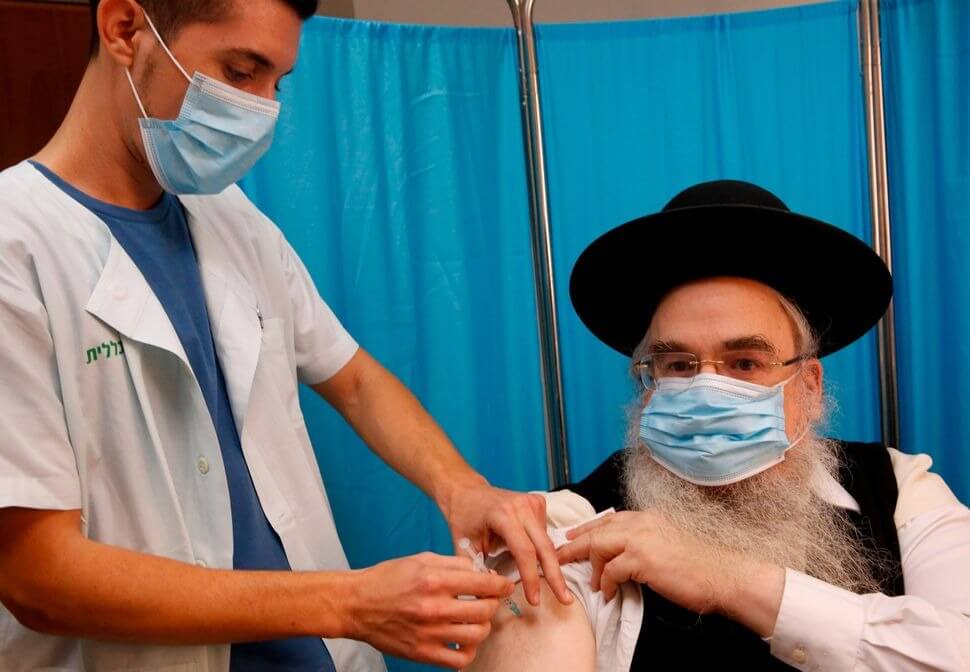Israeli public health experts: Judicial overhaul will negatively impact Israelis’ health
Among other things, the experts worry about the court’s ability to protect health services

A Jewish man in Israel gets administered the COVID-19 vaccine in January, 2021. Photo by Getty Images
This article originally appeared on Haaretz, and was reprinted here with permission. Sign up here to get Haaretz’s free Daily Brief newsletter delivered to your inbox.
The government’s judicial overhaul could negatively impact Israelis’ health, public health experts warned in an article published this weekend in the prestigious medical journal The Lancet.
In the article, titled “Israel’s judicial overhaul: a threat to the Health in All Policies approach,” the authors argued that the recent law abolishing the courts’ power to overturn government policies they deem unreasonable would undermine public health and the judiciary’s ability to protect health services. They also argued that the implications of the article don’t affect Israel alone because similar steps could be taken in other countries.
The authors were particularly concerned about the judicial overhaul’s impact on the principle of “health in all policies” (also known by the acronym HiAP). This principle, which has been adopted by countries worldwide, advocates a holistic approach to health that goes beyond the confines of the health system to include social welfare and decisions that balance the needs of different groups.
“In Israel’s legal landscape, the absence of constitutional protection for the right to health leaves citizens vulnerable to government decisions that disregard health considerations and expert opinions with a singular avenue: filing a petition with the High Court, citing the grounds of unreasonableness,” said one of the co-authors, Dr. Shelly Kamin-Friedman, in a press statement about the article put out by Hebrew University. Kamin-Friedman is a member of Zulat for Equality and Human Rights, a research institute.
Asked by Haaretz why the experts chose to publish their concerns in an international journal rather than a local platform, co-author Prof. Hagai Levine, chairman of the Israel Association of Public Health Physicians replied, “We, the scientists, are the experts on analyzing the situation in Israel and its implications for Israeli public health. Our analysis of the situation in Israel is important for the world, because it has implications for other countries.
“First, this is because there are other countries that could take similar steps to weaken judicial review, with negative health consequences. Second, it’s because health has no borders, as we saw during the pandemic. Harm to public health in Israel could have a negative impact on other countries – for instance, infectious diseases, or improper supervision of food or smoking.”
The article provides several examples of how judicial review has protected Israelis’ health in the past. For instance, in 2018, the finance minister decided not to raise taxes on loose tobacco despite the health risks posed by tobacco. A group of public health experts petitioned the court, arguing that this decision was unreasonable in light of those risks. The court then forced the minister to reconsider, stressing that government must take a policy’s effect on public health into account.
“In a world where science is often overshadowed by politics, it is our duty to be the voice of reason, demanding evidence-based policies that prioritize public health and welfare,” another co-author, Prof. Aron Troen of Hebrew University, said in the press statement. “Our data speak for those who need it the most, urging us to bridge the gap between research and action.”
Another example cited in the article was current Finance Minister Bezalel Smotrich’s decision to cancel the tax on sweetened drinks, despite “extensive evidence from global health organizations” about “the health risks of sugary drinks” and “the effectiveness of the tax in Israel.” The authors elaborated further on this issue in the press statement.
“Israel’s high sugar consumption rates contribute to escalating health issues,” the statement said. “In 2022 a successful beverage tax was introduced, aligned with global practices.” It generated 890 million shekels ($238 million) in tax revenue and “effectively curtailed sugary drink purchases. However, yielding to powerful industry pressures, the government abruptly revoked the tax in 2023 without due process or expert consultation.
“This decision, bereft of consideration for evidence-backed health concerns, underscores the need for a supreme court petition to champion public health interests over political and vested interests,” the statement continued. “The finance minister’s choice to repeal the tax, despite global health warnings and local expert advice, highlights the fragility of public health when unchecked by judicial scrutiny.”
Prof. Nadav Davidovitch, head of the School of Public Health at Ben-Gurion University of the Negev, another co-author, added, “We have diligently assessed the implications of this amendment, carefully navigating the complex interplay between judicial oversight, the imperatives of public health, and the fundamental dynamics of governance. The potential repercussions of this amendment on the equilibrium of political power and its profound impact on societal well-being must not be underestimated.”
Levine said the abolition of the reasonableness standard “constitutes a direct assault on public health, leaving it vulnerable to extreme and irrational ministerial decisions, devoid of defense against political or vested interests.” Yang agreed, saying “the elimination of judicial oversight represents more than a mere legal alteration.”
Moreover, the article warned, “The impact of the amendment is not confined to Israel; it sets a troubling precedent for nations with judicial systems that are unable to sustain accountability. The amendment allows for political interests to supersede public health, potentially facilitating harmful policies. The overhaul of Israel’s judiciary might disrupt the Health in All Policies approach and compromise health considerations in policy making.”














